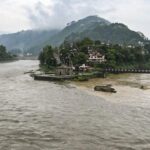Islamabad/New Delhi, April 25, 2025 – Relations between India and Pakistan have reached a dangerous low, as Pakistan has taken sweeping actions in response to India’s suspension of the Indus Waters Treaty (IWT). On April 24, Pakistan officially cut off all trade with India, closed its airspace to Indian aircraft, shut the Wagah border, suspended the historic 1972 Simla Agreement, and warned that any attempt by India to divert water from the Indus River system would be considered an “act of war.”
These actions follow a deadly terrorist attack on April 22 in Pahalgam, a scenic area in Jammu and Kashmir, where militants shot and killed 25 Indian tourists and one Nepalese citizen. The attack, allegedly carried out by Pakistan-based groups Lashkar-e-Taiba and The Resistance Front (TRF), prompted strong backlash from India.
India’s Strong Reaction
In response to the Pahalgam attack, India’s Cabinet Committee on Security, led by Prime Minister Narendra Modi, took swift action on April 23. The government suspended the Indus Waters Treaty, closed the Attari-Wagah border, expelled Pakistani military diplomats, downgraded diplomatic ties, and canceled all visas issued to Pakistani citizens. The Indian government accused Pakistan of backing terrorist groups and stated that Pakistan must prove it has stopped supporting cross-border terrorism before any dialogue could resume.
Also Read: Balochistan Liberation Army (BLA) Hijacks Jaffar Express: Over 180 Hostages Taken in Pakistan
Foreign Secretary Vikram Misri stated that the IWT, which has governed water sharing between the two countries since 1960, would be “held in abeyance” until Pakistan stops promoting terrorism. The treaty, brokered by the World Bank, is critical for Pakistan, which relies on the Indus River system for 80% of its agricultural irrigation and a third of its hydropower.
Pakistan’s Retaliation
In retaliation, Pakistan’s National Security Committee, chaired by Prime Minister Shehbaz Sharif, called India’s actions “illegal and politically motivated.” In a press statement, Pakistan announced the following major steps:
- Trade Cut-off: All trade with India, including indirect trade through other countries, was halted. This is a major blow to the economic ties that had slowly recovered, reaching $1.2 billion in 2024.
- Airspace Closure: Pakistan closed its airspace to Indian-owned and operated aircraft. Indian airlines will now have to take longer and more expensive routes.
- Wagah Border Sealed: The Wagah border crossing, the main land route for trade and travel, was closed for all goods and travelers, effectively isolating both countries.
- Visa Cancellations: All Indian nationals in Pakistan, except Sikh pilgrims, were told to leave within 48 hours. Pakistani citizens in India were asked to return home by April 30.
- Diplomatic Expulsions: Pakistan reduced the Indian High Commission’s staff in Islamabad to 30, expelled Indian defense officials, and declared all military attaches persona non grata. India responded similarly by limiting Pakistan’s diplomatic staff in New Delhi.
- Suspension of Bilateral Agreements: Pakistan placed the 1972 Simla Agreement and all other bilateral treaties on hold, accusing India of repeated violations and cross-border killings.
Most significantly, Pakistan warned that any Indian effort to stop or divert water from the western rivers—Indus, Jhelum, and Chenab—would be treated as an act of war. This declaration raised alarm internationally, as it hinted at possible military confrontation, even including the use of nuclear capabilities.
The Indus Waters Treaty: Now a Flashpoint
The Indus Waters Treaty has been one of the few agreements that survived three wars and decades of hostility. It gives India control over the eastern rivers (Ravi, Beas, Sutlej) and Pakistan control over the western ones. Pakistan’s Foreign Ministry has strongly rejected India’s suspension of the treaty, arguing that no country can unilaterally break such a binding international agreement.
Environmental experts warn that while India cannot immediately block water flows due to limited reservoir capacity, it could eventually build dams or modify existing infrastructure to reduce water supply to Pakistan during the dry season. That would hurt Pakistan’s already stressed agriculture, especially during droughts and climate change-driven shortages.
Khalid Hussain Baath, head of a Pakistani farmers’ union, called the situation “a true war,” emphasizing that farmers are already struggling with low rainfall and rising temperatures.
Rising Regional and Global Concerns
The confrontation has sparked protests in both countries. In India, angry citizens have demanded strong action against Pakistan. In Pakistan, religious and political groups have condemned India’s treaty suspension and blocked roads near the Indian embassy.
The crisis has also weakened South Asian cooperation under regional groups like SAARC. The airspace closure and halted trade are affecting businesses and airlines across the region.
Internationally, the crisis is worrying due to the presence of nuclear weapons on both sides. The World Bank, which brokered the Indus Waters Treaty, has no enforcement power but may be asked to mediate. China, which controls the river’s headwaters in Tibet, could also become involved, adding to the complexity.
Experts warn that these moves are dangerous. Water resources expert Himanshu Thakkar noted, “Right now, the suspension is mostly symbolic. But it sets a risky precedent and can escalate into something much worse if not handled carefully.”
What Happens Next?
Neither side is showing signs of backing down. Prime Minister Modi has vowed to “track and punish” those responsible for the Pahalgam attack. Pakistan’s government has stated that its military is fully prepared to respond to any Indian action.
There is growing fear that what began as a terrorist incident may spiral into a wider conflict involving war, water scarcity, and possible military engagement. Many international observers are calling for urgent dialogue and restraint.
For now, the Indus River, which supports the lives of millions across both countries, has become the latest battleground in a bitter, long-standing rivalry that continues to threaten peace in South Asia.








![World Blood Donor Day 2022 [Hindi] Theme, Quotes, History, Importance](https://tubelighttalks.com/wp-content/uploads/2021/06/World-Blood-Donor-Day-2022-Hindi-Theme-Quotes-History-Importance-1.jpg)
![World Environment Day 2022 [Hindi] Theme, Quotes, History, Aim](https://tubelighttalks.com/wp-content/uploads/2021/06/World-Environment-Day-2022-Hindi-Theme-Quotes-History-Aim-1.jpg)
